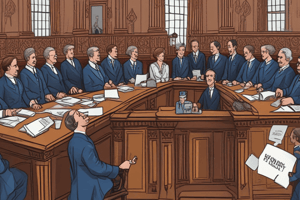Podcast
Questions and Answers
What is a Main Motion?
What is a Main Motion?
Introduce subjects to the assembly for its consideration.
What are Subsidiary Motions?
What are Subsidiary Motions?
Change or affect how the main motion is handled.
What are Privileged Motions?
What are Privileged Motions?
Motions of importance that take precedence over the pending question.
What are Incidental Motions?
What are Incidental Motions?
What is a Raise a Question of Privilege?
What is a Raise a Question of Privilege?
What does Call for the Orders of the Day mean?
What does Call for the Orders of the Day mean?
What does Lay on the Table do?
What does Lay on the Table do?
What is Previous Question?
What is Previous Question?
What does Limit or Extend Limits of Debate do?
What does Limit or Extend Limits of Debate do?
What is Postpone Definitely?
What is Postpone Definitely?
What is Postpone Indefinitely?
What is Postpone Indefinitely?
What motions bring a question again before the assembly?
What motions bring a question again before the assembly?
What is Reconsider?
What is Reconsider?
What is an Agenda?
What is an Agenda?
What is an Amendment?
What is an Amendment?
What does Appeal (of an assembly) mean?
What does Appeal (of an assembly) mean?
What are Bylaws?
What are Bylaws?
Who is the Chair?
Who is the Chair?
A common ______ means that the majority is in agreement.
A common ______ means that the majority is in agreement.
What is Debate?
What is Debate?
What is a Division of an Assembly?
What is a Division of an Assembly?
What is Division of a Question?
What is Division of a Question?
What is the Floor?
What is the Floor?
What is Inquiry?
What is Inquiry?
What is Parliamentary Law?
What is Parliamentary Law?
What does Pending mean?
What does Pending mean?
What is Precedence?
What is Precedence?
What is Quorum?
What is Quorum?
What does Rescind mean?
What does Rescind mean?
What is a Secondary Motion?
What is a Secondary Motion?
What does Suspend the Rules mean?
What does Suspend the Rules mean?
What is a Two-Thirds Vote?
What is a Two-Thirds Vote?
What is Unfinished Business?
What is Unfinished Business?
What does Withdraw a Motion mean?
What does Withdraw a Motion mean?
Flashcards are hidden until you start studying
Study Notes
Main Motion
- Introduces subjects for assembly consideration.
- Cannot be made when another motion is pending.
Subsidiary Motions
- Change or affect the handling of the main motion.
- Must be voted on before the main motion.
Privileged Motions
- Take precedence over pending questions and require immediate action.
- Undebatable.
Incidental Motions
- Address procedural questions arising from other motions.
- Must be considered prior to the related motion.
Raise a Question of Privilege
- Allows a member to address issues like noise or lighting.
- Can interrupt proceedings, requires no second, and is undebatable.
Call for the Orders of the Day
- Demands adherence to the agenda.
- No second required, can interrupt discussions, and must be enforced by the chair.
Lay on the Table
- Postpones decision on a motion until the next meeting.
- Requires recognition and a second; not debatable or amendable.
Previous Question
- Calls for an immediate vote on a motion.
- Requires recognition and a second; not debatable and needs a 2/3 vote.
Limit or Extend Limits of Debate
- Reduces or extends the number of speeches or time allotted for debate.
- Requires recognition, a second, and a 2/3 vote; is amendable.
Postpone Definitely
- Delays action on a motion until specified time.
Postpone Indefinitely
- Permanently removes a motion from debate.
- Requires a second, is debatable but not amendable.
Motions That Bring a Question Again Before the Assembly
- Includes Reconsider, Rescind, Take from the Table, Discharge a Committee, and Amend Something Previously Adopted.
Reconsider
- Seeks a new vote on a motion, only applicable to members who voted on the prevailing side.
Agenda
- The program for the meeting.
Amendment
- Alters a main motion without changing its meaning, by inserting, changing, or striking out words.
Appeal (of an Assembly)
- Questions the validity of a vote count, requesting members to stand for a recount.
Bylaws
- Permanent legislative rules governing an organization, often combined with a constitution.
Chair
- The presiding officer of a meeting, can be temporary or permanent.
Consent
- Agreement among members for actions by the chair; general consent indicates majority agreement.
Debate
- Refers to discussion regarding motions; motions often allow for this right.
Division of an Assembly
- A method for members to express support by standing to be counted after an appeal.
Division of a Question
- A procedure allowing members to stand and be counted if there is doubt about a vote count.
Floor
- The privilege to address the assembly; yielding the floor means temporarily giving up speaking rights.
Inquiry
- A directed question to the chair for clarification on parliamentary procedure.
Parliamentary Law
- Unwritten laws of democratic procedure based on historic rules from the English Parliament.
Pending
- Indicates a motion is awaiting a decision.
Precedence
- The hierarchy of motions; higher ranking motions are addressed before those of lower rank.
Quorum
- The minimum required number of members for a meeting to conduct business legally.
Rescind
- To make a previously accepted motion or action void, unless already enacted.
Secondary Motion
- Any motion that may be proposed while a main motion is pending.
Suspend the Rules
- A temporary disregard of organizational rules, facilitating action on pending motions.
Two-Thirds Vote
- A voting requirement where two-thirds of members present must agree for an action to pass.
Unfinished Business
- Items on the agenda requiring resolution, including tabled or postponed motions.
Withdraw a Motion
- The act of removing a motion from consideration before the assembly.
Studying That Suits You
Use AI to generate personalized quizzes and flashcards to suit your learning preferences.




